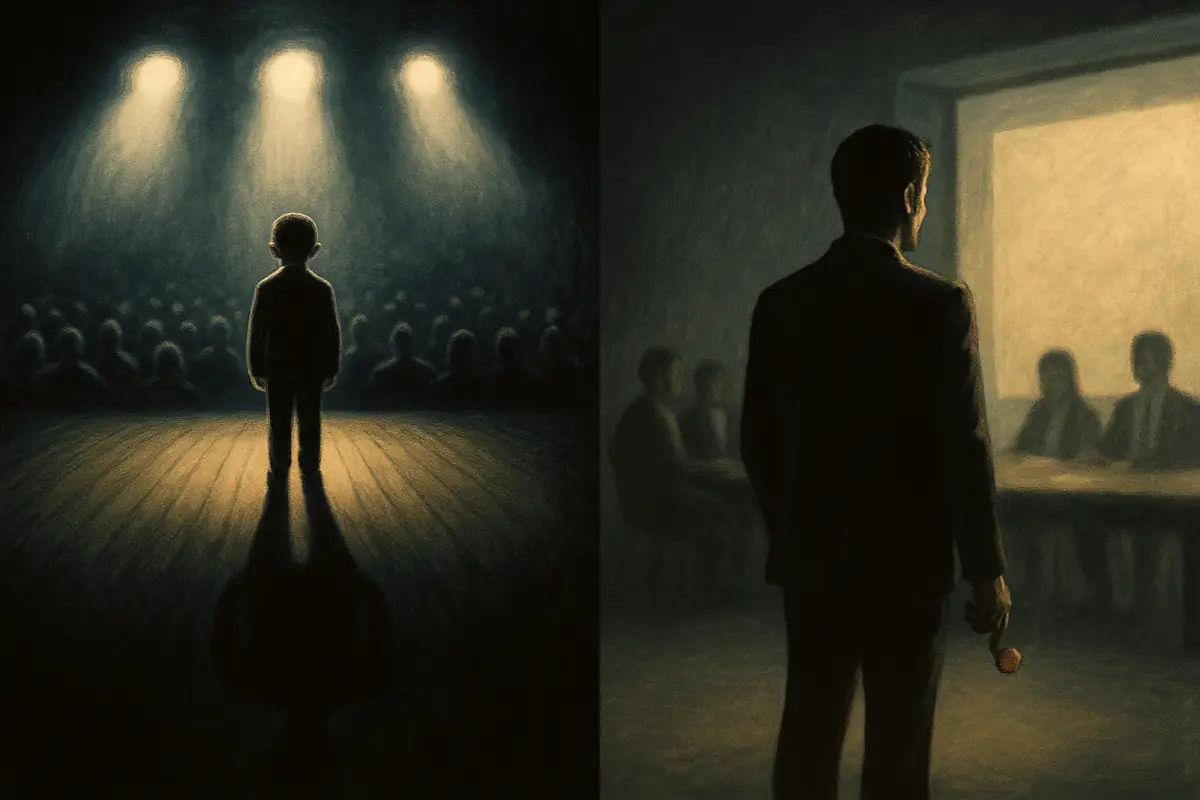The Center of the Room
With insights from Dale Carnegie and Gigi Rosenberg
Part 1: The Pressure Cooker
Leo had twenty-six minutes before the all-hands meeting, and his body had already decided to betray him. A cold, clammy sweat slicked his palms, making the mouse feel slippery and foreign in his hand. His heart hammered against his ribs, a frantic, trapped bird trying to beat its way out of his chest.
He stared at the title slide on his monitor, his name glowing under the project title. This wasn’t just another quarterly update. This was Project Nightingale, the culmination of a year of his life—of late nights, sacrificed weekends, and a level of focus so intense it had blurred the world around him. The work was brilliant. He knew it was. The analysis was sound, the solution elegant.
But the work couldn’t speak for itself. He had to.
And that was the problem.
The pressure wasn’t just about his career. It was about the ghost in the room—his father. A man who could command a stage with an easy smile and a story, who could make complex ideas feel simple and vital. His dad’s worn copy of Dale Carnegie’s How to Win Friends and Influence People sat on his bookshelf at home, its spine cracked, its pages filled with his father’s confident underlines. Leo felt like a cheap imitation, a son who had inherited the ambition but none of the requisite grace. Today felt less like an opportunity and more like a final verdict on whether he would ever measure up.
His gaze flickered to David, the CTO, holding court by the coffee machine. David had that same easy charisma, that same aura of effortless command. The thought of standing before him, of his voice wavering or his mind going blank, sent a fresh wave of nausea through him.
He was going to fail. He was going to fail the project, fail himself, and worst of all, fail the memory of the man he so desperately wanted to make proud.
Emotional Trigger: The Fear of Inadequacy
“I’m going to fail and prove I’m not good enough, just like I feared.”
EFT Tapping Script:
Setup (rubbing the sore spot on the chest): “Even though I feel this crushing pressure to be perfect, and I’m terrified I’ll prove I’m a fraud, I choose to honor the work I’ve done and the man I am right now.”
Sequence:
Eyebrow: This crushing pressure.
Side of Eye: I have to get this right.
Under Eye: All this fear I’ll never be good enough.
Under Nose: This terror of failing him.
Chin: I feel sick with all this fear.
Collarbone: What if they see how scared I am?
Under Arm: This deep, aching belief that I’m an imposter.
Top of Head: I want to be free of this pressure, just for a moment.
Part 2: The Ghost of the Auditorium
The panic in his chest was a time machine. He closed his eyes, and a memory surfaced—not the one that haunted him, but the one that came before. He was thirteen, in his dad’s study, the smell of old books and coffee in the air. His father was leaning over his shoulder, his eyes alight with a shared passion as they reviewed the notecards for his Apollo 11 presentation. His dad wasn’t a critic; he was a co-conspirator. “See, Leo?” his voice, warm and encouraging, echoed in his memory. “The facts are good, but the story is what matters. You’ve got it. Just get up there and tell them the story.”
But then, the warmth of the memory curdled, replaced by the ice-cold reality of what happened next. The sterile hum of the office faded, and he was back in the middle school auditorium. He could feel the stage lights on his face, the vast, dark expanse of the crowd before him. He’d stepped up to the microphone, his dad’s encouraging words ringing in his ears. He looked out at the sea of faces, opened his mouth, and… nothing.
His mind was a white wall. The story was gone. The words, which he had practiced for weeks, evaporated. He just stood there, his mouth opening and closing like a fish, the silence growing heavier and heavier until it was a physical weight.
Then came the sound that would define his life for fifteen years. A single snicker from the back row. It was a spark in a tinderbox. Another laugh joined it, then another, until a wave of ridicule washed over him. He could feel hundreds of eyes on him, not with expectation, but with pity and amusement. His face burned with a heat so intense he thought he might actually combust. He dropped his notecards, turned, and fled the stage, the sound of laughter chasing him all the way down the hall.
He’d locked himself in a bathroom stall and sobbed, not just from humiliation, but from the gut-wrenching feeling that he had profoundly, unforgivably, failed the beautiful, shared story he and his father had built together.
Emotional Trigger: The Trauma of Humiliation
“That feeling is unbearable. I can’t go through that again. It’s safer to hide and play small than to risk that kind of pain.”
EFT Tapping Script:
Setup: “Even though the memory of that humiliation feels like it’s happening right now, and my body is screaming at me to run, I accept that this was a part of my story, and I am safe now.”
Sequence:
Eyebrow: That horrible feeling on stage.
Side of Eye: The sound of them laughing.
Under Eye: The burning shame in my face.
Under Nose: Forgetting that beautiful story.
Chin: This part of me that is still that terrified kid.
Collarbone: All this proof that it’s not safe to be seen.
Under Arm: My body wants to run and hide.
Top of Head: I acknowledge that old pain, and I choose to breathe right here, in this moment.
Part 3: The Shift from Performance to Purpose
Leo sat at his desk, reeling from the memory. How can I do this? he thought. How can I walk back into that fire?
His eyes landed on his monitor, on the intricate data visualizations. He thought of the engineers who needed to understand the new architecture, the project managers who needed the timeline. He remembered the line from his father’s Dale Carnegie book, double-underlined in red ink: “You can make more friends in two months by becoming interested in other people than you can in two years by trying to get other people interested in you.”
It hit him like a lightning bolt. His entire focus was on himself. His fear. His performance. He was trying to get them interested in him.
But it wasn’t about him. It was about them. His job wasn’t to perform; it was to serve. To connect. To give them something of value that would make their jobs easier. To translate the complex work into a clear, compelling story—just like his dad had told him.
He could do that. He wanted to do that.
Emotional Trigger: The Need for Perfection
“I have to impress them. I have to be flawless, witty, and brilliant. If I’m not perfect, I’ve failed.”
EFT Tapping Script:
Setup: “Even though I’m trapped in this belief that I have to be perfect to be worthy, I want to remember the real reason I’m doing this—to connect and to serve.”
Sequence:
Eyebrow: This crushing need to be perfect.
Side of Eye: Trying so hard to impress everyone.
Under Eye: But this pressure is just feeding the fear.
Under Nose: It’s not about me being the star.
Chin: It’s about the work. It’s about the team.
Collarbone: Releasing the need to perform.
Under Arm: Choosing to connect instead.
Top of Head: My purpose is to give, not to get.
Part 4: The Walk to the Front
“Leo? We’re ready for you.”
The voice cut through his thoughts. He stood up on legs that felt unsteady. As he walked toward the front of the room, he felt the familiar tightening in his chest. He used a physical grounding technique from speaking coach Gigi Rosenberg. He focused on his feet, feeling the soles of his dress shoes connect with the thin corporate carpet. I am here, he thought. I am standing on solid ground. It was a small, silent act of defiance against the panic.
Emotional Trigger: The Persistence of Nerves
“I still feel nervous. This isn’t working. If I’m not calm before I start, it means I’m not ready and I’m going to fail.”
EFT Tapping Script (discreetly, or mentally):
Setup: “Even though my chest is still tight and the nerves are still here, I am allowed to take them with me. I don’t have to be fearless to be effective.”
Sequence:
Eyebrow: Still so nervous.
Side of Eye: I wish this feeling would just go away.
Under Eye: But I’ve felt this before.
Under Nose: I can breathe through this moment.
Chin: I don’t need to be fearless.
Collarbone: Just steady enough.
Under Arm: Even with nerves, I can speak my truth.
Top of Head: I can take my fear with me to the front of the room.
Part 5: The Stumble and the Redemption
He began. He found a friendly face in the audience—Ana, from the engineering team—and spoke to her. And it was working. The words were coming.
Then he got to slide five. The slide with the most complex data. He opened his mouth to explain the projection, and the number… was gone. A white wall. A void where the data used to be.
Time seemed to warp, slowing down and stretching into an unbearable taffy of silence. His throat closed up, a knot of pure ice. The clicker in his hand felt impossibly heavy. He could feel the blood draining from his face, a cold rush that left his skin clammy. He saw the CTO, David, shift in his chair, a flicker of something—impatience? pity?—in his eyes. The air crackled with the collective, unspoken question: Is he going to crash?
The ghostly sound of laughter from a middle school auditorium echoed in his ears. For one heart-stopping second, he was thirteen again, exposed and utterly lost. Run, his body screamed. Flee.
But this time was different. Instead of letting the panic consume him, he deployed his emergency reset. He took a deliberate breath. He pressed his thumb against his index finger under the cover of the lectern. It’s okay to pause, he told himself. Breathe. They are still with you. Just find the next word.
He looked up, not with the panicked eyes of a scared child, but with the calm of a professional problem-solving in real-time.
“Let me put that a simpler way,” he said, his voice steady. He clicked to the next slide, which had a clearer graph. “The key takeaway is this…”
He continued. No one flinched. The world did not end. He hadn’t just survived the moment; he had controlled it. He had faced the dragon from his past, and for the first time in his life, he hadn’t run. It was a victory so profound it almost made him dizzy with relief.
Emotional Trigger: The In-the-Moment Freeze
“I’m blanking! It’s happening again! I’ve lost them and I can’t recover. This is the end.”
EFT Tapping Script (Mental Reset):
Setup (a deep, internal breath): “Even though I’m frozen, I am safe. I am allowed to pause and find my footing.”
Sequence (mental phrases while pressing fingers):
Thumb-to-Finger 1: It’s okay to be silent.
Thumb-to-Finger 2: Just one breath.
Thumb-to-Finger 3: I am safe to find my place.
Thumb-to-Finger 4: They are still with me. I am in control.
Part 6: The Aftermath
Back at his desk, the meeting continued around him, but Leo was in another world. The adrenaline faded, replaced by a quiet, vibrating peace. He had stumbled, and he had recovered. He had been terrified, and he had spoken anyway.
The victory wasn’t in the polite applause or the “good work, Leo” from his boss. The victory was the breaking of a fifteen-year-old spell. It was the quiet knowledge that he had walked through the fire and come out the other side, not unscathed, but whole. He looked at the empty chair in his mind where his father’s judgment used to sit and felt not a sense of failure, but a quiet, tear-jerking pride. He had done it his way. He wasn’t his father, and that was okay. He was himself.
The fear wasn’t gone forever. He knew it would visit again. But it no longer owned him. It was just a feeling, a passenger. And for the first time, he knew he was the one driving.
Emotional Trigger: The Post-Mortem Self-Criticism
“It wasn’t perfect. I stumbled. That voice in my head—my father’s voice—is saying it wasn’t good enough.”
EFT Tapping Script:
Setup: “Even though I’m focusing on the one thing that went wrong, and I can almost hear my dad’s voice saying ‘good isn’t good enough,’ I choose to feel proud of my courage today.”
Sequence:
Eyebrow: It wasn’t perfect.
Side of Eye: That stumble on slide five.
Under Eye: Hearing that critical voice in my head.
Under Nose: Releasing his impossible standards.
Chin: But I stayed steady. I didn’t run.
Collarbone: I spoke anyway. That’s the real victory.
Under Arm: Choosing my own definition of success.
Top of Head: I can feel proud of myself, exactly as I am.
Finding Your Own Voice
Leo’s story isn’t about eradicating fear. It’s about changing our relationship with it. The tools he used—grounding techniques from Gigi Rosenberg, a shift in perspective inspired by Dale Carnegie, and the emotional regulation of EFT Tapping—are not magic wands. They are anchors. They are practical, repeatable methods for staying present when your body and mind are screaming at you to check out.
The goal isn’t to become a perfect, fearless speaker overnight. It is to build the resilience to stand on shaky ground, to breathe through the static, and to recover from the stumbles that are an inevitable part of growth. It is about acknowledging the ghosts of the past without letting them steer your future. By doing so, you create the space needed for your own voice, finally, to lead the way.



